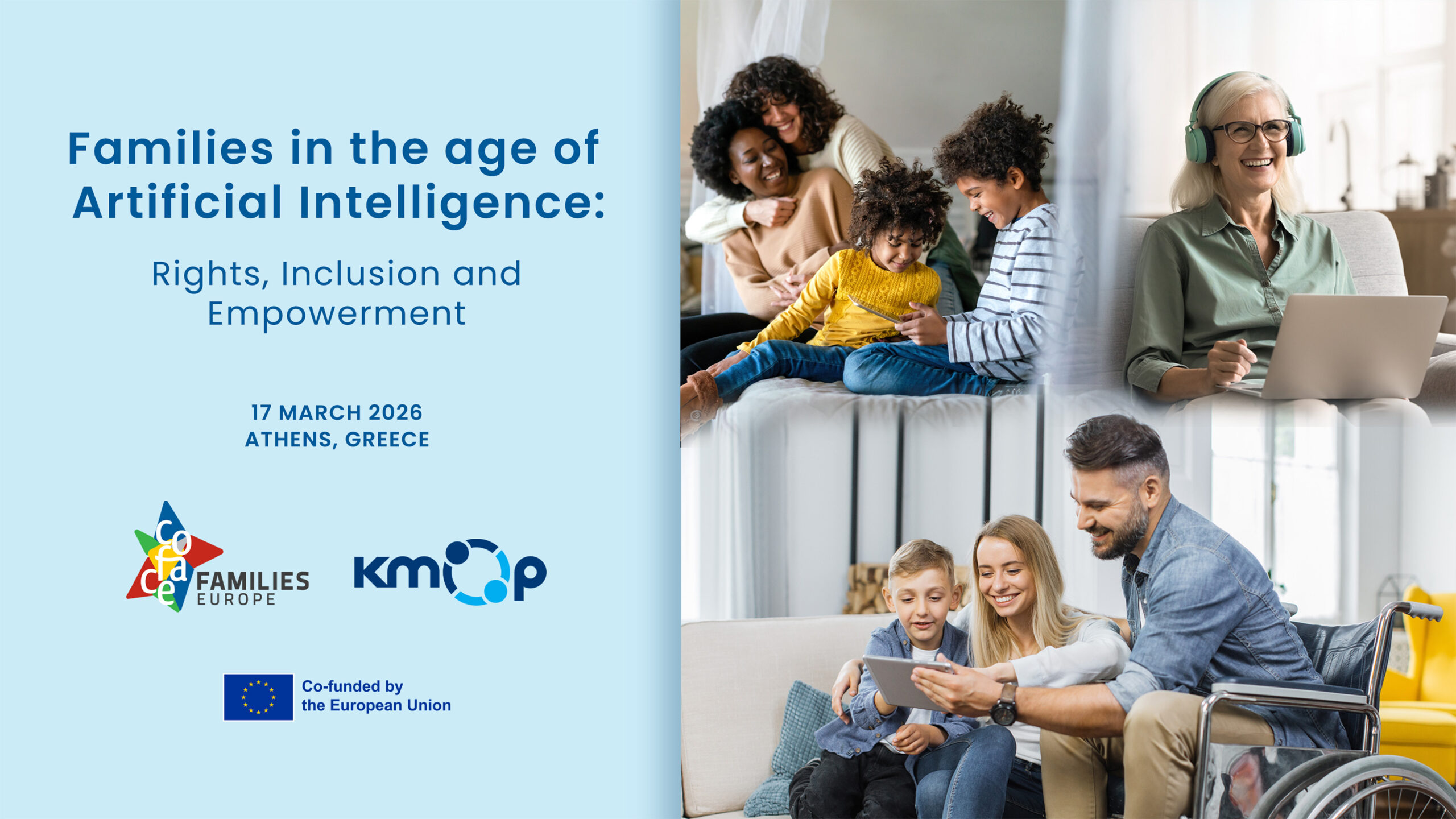Brussels, 25-26 September 2025
The conference objectives and core themes
Co-hosted by COFACE Families Europe and the Odisee Centre for Family Studies in Brussels, this conference convenes researchers, policymakers, public administrators, and NGOs to advance integrated, place-based strategies that strengthen family resilience and equity through systemic service coordination. Centering on policy levers that empower municipalities and amplify early investments, the event will explore how cross-sector collaboration enhances service quality and maximizes long-term societal returns.
The program features a keynote roundtable followed by four interactive streams, each structured as workshops to foster debate and cross-fertilization of ideas. Stream 1 reimagines ECEC centers as community anchors, coordinating education, health, and social support. Stream 2 examines integrated service hubs to streamline access for families. Stream 3 tackles governance innovations to break silos in local prevention efforts, while Stream 4 harnesses digital tools to bridge service gaps.
Core themes include:
- Strengthening local ecosystems: Municipal leadership, data-driven decision-making, and sustainable funding as key resilience levers.
- Systemic coordination for quality: How aligning housing, health, and education services improves efficacy and equity in service provision.
- Scaling what works: From Flanders’ Huis van het Kind model to Estonia’s digital platforms, showcasing actionable frameworks for replication.
By bridging research, policy, and practice, the conference will identify scalable solutions to build resilient communities where families thrive.
Context and background
The European Observatory on Family Policy is a joint programme of COFACE Families Europe and the Center for Family Studies. It aims to serve as a platform for the observation, analysis, and dissemination of evidence on family policy and other social concerns directly relevant to family well-being across the European Union.
The Observatory brings together different perspectives on family resources and needs from a range of public policy, research, and advocacy contexts. It strives to integrate these viewpoints into a unified theoretical framework, and to design suitable recommendations for policymaking at EU, national, and local levels. Key outputs include a European monitoring report published in 2024 Towards greater family policy integration in Europe and in 2025 a Factsheet on the Childcare gap in the European Union.
The starting point for the Observatory is human rights, gender equality, social inclusion, diversity, empowerment, and intergenerational solidarity, with a stated ambition of promoting policies which support all types of families, without discrimination.
Programme and meeting report
See full programme here.
See full meeting report here.
On 25th September we will kick off with a plenary debate, and then divide into four streams of work throughout the day focusing on:
1.Expanding the boundaries of ECEC: This stream will examine the expanding role of early childhood education and care services, analysing how their mandates are broadening to include parental support. The morning session will explore leadership challenges and local innovations, focusing on North Rhine-Westphalia’s pioneering certification model for ECEC centres transitioning into Familienzentren. The afternoon session will investigate how ECEC centres can serve as anchors for multidisciplinary local service networks.
2.Integrated family support models: The stream will focus on multidisciplinary support models for parents with young children, showcasing international examples of co-located, intersectoral services. Case studies include Flanders’ Huizen van het Kind, now a decade-old initiative; Estonia’s family nests; Save the Children Italy’s Poli millegiorni centres; and Bulgaria’s Tulip Foundation family centres
3.Prevention through cross-sectoral collaboration: The stream will approach cross-sectoral collaboration through the lenses of prevention and nurturing care, emphasizing cooperative networks rather than centralized hubs. Discussions will highlight Germany’s Fruehe Hilfen networks and Praeventionsketten, examining their impact from a prevention perspective. A second panel will explore collaborative strategies to prevent child institutionalization through nurturing care frameworks.
4.Innovations for equitable family support: The stream will address digital innovation as a tool for equity, presenting platforms that improve access to family support services. Finland’s SOTE reform will be discussed, including its digital family centres under the new “wellbeing service counties” administrative model. Estonia’s Prevention Council and automated data-sharing mechanisms for families with disabled children will also be examined, illustrating how technology can streamline benefits/service delivery.
On 26th September, we will organise a site visit to the Elmer house in Brussels. As a ECEC neighbourhood service, Elmer organises social day-care (3 months – 3,5 years) and has 4 branches in the most underprivileged areas of the Brussels Region. Elmer aims to reach a socio-cultural mix of families living in the neighbourhood and focuses especially on vulnerable families. In total Elmer has a capacity for 190 children. Each year we count more than 400 children in our daycare services. Elmer enables the wellbeing of each child, offers rich opportunities to develop and stimulates connectedness. Parent participation is a keystone in the work of Elmer. The parents are the first educators, together we are co-educating the children. Elmer aims to work on social participation of parents and organizes opportunities for young parents to meet and share experiences in education. In the neighbourhood, Elmer is an active partner in common activities. In Schaarbeek, Elmer also organises a family centre as an integrated service. We combine preventive family support, medical prevention in the early years, educational activities for children and parents, guidance on education, social participation and language development, with childcare. The family centre reaches over 500 families each year. As centre for inclusion, Elmer gives particular attention to children with special needs and supports their families. Elmer combines the ECEC-service with employment and training of educators – often recruited out of the group of parents. The team of Elmer is very diverse, as are the children and their families.
Resources
Presentations Keynote panel
- Wim VAN LANCKER, KU Leuven
- Christian MORABITO, Save the Children
- Mara YERKES, Utrecht University
- Olivier THÈVENON, OECD
Presentations Stream 1: EXPANDING THE BOUNDARIES OF ECEC
- Geraldine LIBREAU, European Commission
- Hester HULPIA, Artevelde University of Applied Sciences
- Sandra FISCHER, University of Bonn
- Elizabeth SHUEY, OECD
- Mihaela IONESCU, International Step by Step Association
- Anne LAMBRECHTS, Elmer
Presentations Stream 2: INTEGRATED FAMILY SUPPORT MODELS
- Tine ROMMENS, Opgroeien Agency & Ivan PAUWELS, Association of Flemish Cities and Municipalities
- Luciano MALFER, FBK Foundation
- Maarja OVIIR-NEIVELT, Lapseheaolu
- Maria PETKOVA, Tulip Foundation
Presentations Stream 3: PREVENTION THROUGH CROSS-SECTORAL COLLABORATION
- Ivelina BORISOVA, & Sanja BUDISAVLJEVIC, UNICEF
- Jörg FISCHER, Erfurt University
- Christina WIEDA, Bertelsmann Foundation
- Debora SANGUINATO, Save the Children
- Giorgio TAMBURLINI, Centro per la Salute delle Bambine e dei Bambini
- Paola MILANI University of Padua
Presentations Stream 4: INNOVATIONS FOR EQUITABLE FAMILY SUPPORT
- Rense NIEUWENHUIS, Stockholm University
- Maria Kaisa AULA, Welfare area of Central Finland
- Marina WETZER-KARLSSON, Väestölitto – the Family Federation of Finland
- Hanna VSEVIOV, Estonian Ministry of Social Affairs
- Claudia PERONI, Eurofound




